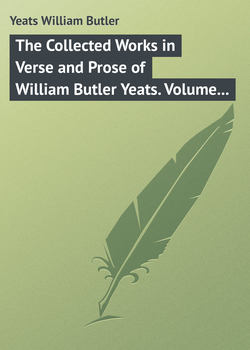Читать книгу The Collected Works in Verse and Prose of William Butler Yeats. Volume 8 of 8. Discoveries. Edmund Spenser. Poetry and Tradition; and Other Essays. Bibliography - Yeats William Butler, William Butler Yeats - Страница 25
EDMUND SPENSER
III
ОглавлениеWhen Spenser was buried at Westminster Abbey many poets read verses in his praise, and threw then their verses and the pens that had written them into his tomb. Like him they belonged, for all the moral zeal that was gathering like a London fog, to that indolent, demonstrative Merry England that was about to pass away. Men still wept when they were moved, still dressed themselves in joyous colours, and spoke with many gestures. Thoughts and qualities sometimes come to their perfect expression when they are about to pass away, and Merry England was dying in plays, and in poems, and in strange adventurous men. If one of those poets who threw his copy of verses into the earth that was about to close over his master were to come alive again, he would find some shadow of the life he knew, though not the art he knew, among young men in Paris, and would think that his true country. If he came to England he would find nothing there but the triumph of the Puritan and the merchant – those enemies he had feared and hated – and he would weep perhaps, in that womanish way of his, to think that so much greatness had been, not as he had hoped, the dawn, but the sunset of a people. He had lived in the last days of what we may call the Anglo-French nation, the old feudal nation that had been established when the Norman and the Angevin made French the language of court and market. In the time of Chaucer English poets still wrote much in French, and even English labourers lilted French songs over their work; and I cannot read any Elizabethan poem or romance without feeling the pressure of habits of emotion, and of an order of life which were conscious, for all their Latin gaiety, of a quarrel to the death with that new Anglo-Saxon nation that was arising amid Puritan sermons and Mar-Prelate pamphlets. This nation had driven out the language of its conquerors, and now it was to overthrow their beautiful, haughty imagination and their manners, full of abandon and wilfulness, and to set in their stead earnestness and logic and the timidity and reserve of a counting-house. It had been coming for a long while, for it had made the Lollards; and when Anglo-French Chaucer was at Westminster its poet, Langland, sang the office at St. Paul’s. Shakespeare, with his delight in great persons, with his indifference to the State, with his scorn of the crowd, with his feudal passion, was of the old nation, and Spenser, though a joyless earnestness had cast shadows upon him, and darkened his intellect wholly at times, was of the old nation too. His Faerie Queene was written in Merry England, but when Bunyan wrote in prison the other great English allegory Modern England had been born. Bunyan’s men would do right that they might come some day to the Delectable Mountain, and not at all that they might live happily in a world whose beauty was but an entanglement about their feet. Religion had denied the sacredness of an earth that commerce was about to corrupt and ravish, but when Spenser lived the earth had still its sheltering sacredness. His religion, where the paganism that is natural to proud and happy people had been strengthened by the platonism of the Renaissance, cherished the beauty of the soul and the beauty of the body with, as it seemed, an equal affection. He would have had men live well, not merely that they might win eternal happiness but that they might live splendidly among men and be celebrated in many songs. How could one live well if one had not the joy of the Creator and of the Giver of gifts? He says in his Hymn to Beauty that a beautiful soul, unless for some stubbornness in the ground, makes for itself a beautiful body, and he even denies that beautiful persons ever lived who had not souls as beautiful. They may have been tempted until they seemed evil, but that was the fault of others. And in his Hymn to Heavenly Beauty he sets a woman little known to theology, one that he names Wisdom or Beauty, above Seraphim and Cherubim and in the very bosom of God, and in the Faerie Queene it is pagan Venus and her lover Adonis who create the forms of all living things and send them out into the world, calling them back again to the gardens of Adonis at their lives’ end to rest there, as it seems, two thousand years between life and life. He began in English poetry, despite a temperament that delighted in sensuous beauty alone with perfect delight, that worship of Intellectual Beauty which Shelley carried to a much greater subtlety and applied to the whole of life.
